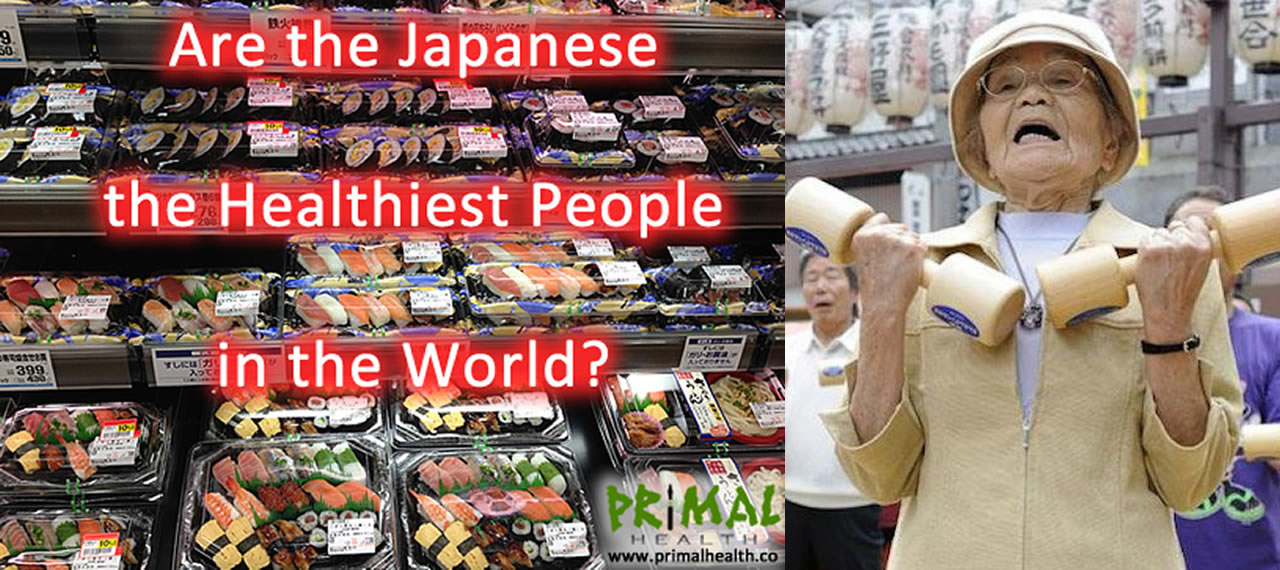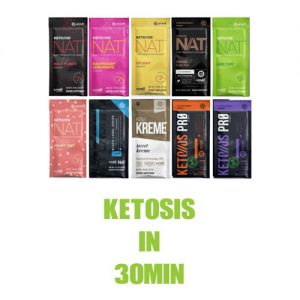According to the WHO stats, the Japanese are some of the longest living people in the world. But a long life doesn’t necessarily mean a healthy one. Personally, we would rather add life to our years than years to our life, so we like to study healthy people and copy what they do. Here’s what we found when we lived in and visited Japan and analysed their diet and lifestyle…
Is the Japanese diet really that healthy?
Seafood and processed food
Most people attribute the long average lifespan of the Japanese to a mostly primal diet rich in seafood. While it is true that the Japanese do eat a good amount of seafood, including various types of nutrient-rich seaweeds, these days their traditional foods are very processed and often replaced with modern commercial western foods.
Breakfast gone bad
We have only lived in the Tokyo area, and I would assume the big cities suffer more from this food commercialisation than the rural villages and countryside towns. However, in the Tokyo area, Japanese people often eat a breakfast not unlike the SAD (Standard American Diet) breakfast: boxed cereals, processed milk, bakery goods, or just coffee and toast. There are bakeries absolutely everywhere, offering sugary processed alternatives to the traditional Japanese breakfast of rice, fermented soybeans, fish and vegetables for many city-dwelling Japanese.
Dessert
In addition to fancy cakes, crepes, profiteroles and other European sweets, there are plenty of traditional Japanese desserts, mostly made from rice and beans, which makes them seem much healthier, even though they are sweetened with sugar. When not homemade, however, they are laden with the usual preservatives, additives, and processed sugars and syrups.
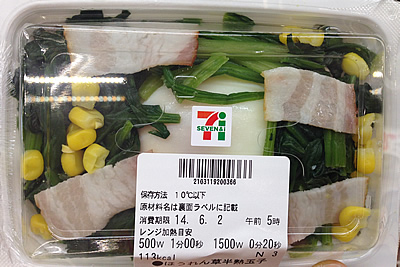
We thought there were healthy food selections at 7-11, like this spinach and pork, until we translated the long ingredient list on the back of the package.
Traditional foods all wrapped in plastic
The same goes with pre-packaged bento boxes, sushi rolls, rice balls, and even salads. At a glance, they are traditional healthy goodness. Fish, seaweed, rice, radish, ginger, fermented veggies and the like. And yes, if Japanese meals are home-cooked with traditional ingredients, they are surely the staples of long-living, healthy people. But in bustling Tokyo and its sprawling suburbs, these traditional meals are packaged up with long ingredient lists that include stabilisers, preservatives, artificial colours and flavours, MSG, and various sugars. I talk about this in my article about eating gluten-free in Japan, as many traditionally gluten-free Japanese foods are now full of processed wheat. As in many other societies, traditions are not being passed onto the new generations, who only know a world of ready-made food.
Organic food in Japan
Driving or taking a train through rural Japan, you can see plot after plot of home-grown and community-grown fruits and vegetables. I have no doubt this is a key factor in Japanese longevity. These days, however, a great number of Japanese buy most of their food from the supermarket, where the produce comes from heavily chemical sprayed farms and the meat is mostly factory farmed. There is also tons of imported food in the shops – American pork, bananas from the Philippines, Aussie beef, Vietnamese farmed fish – which our Japanese friends say is because it’s just so much cheaper to import.
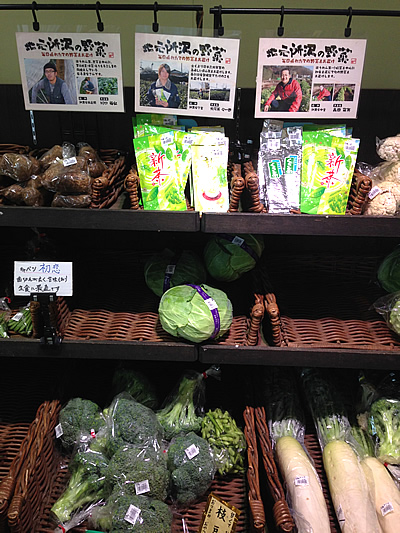
One Tokyo suburb supermarket had a section showing pictures and locations of the farmers who grew the food. But no information on chemical use.
Our few health-conscious Japanese friends have sourced organic or spray-free produce, through a weekly farm box delivery, but properly raised meat is hard to find and very expensive, so they just don’t eat too much of it. There doesn’t seem to be many places to buy organically grown/raised plant and animal food in Tokyo, though the magazine for the English-speaking community lists 4 weekly farmers markets, touting either organic, farm fresh or just local.
One friend is very vigilant not to buy fish caught anywhere near Fukushima, for fear of radiation levels from the nuclear plant. Other people, however, say they heard on the news that people over 20 years old are not affected by radiation, so they don’t think about it. Hmm…
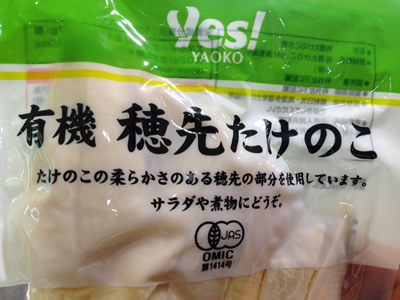
The symbol at the bottom is one of the logos for Japanese certified organic food
My lifestyle determines my death style
Ok, that line is a bit dramatic, but it’s a favourite from a Metallica song and has a great ring of truth to it. For the Japanese, just as with the contradiction between their traditional and modern diet, there is a great gap between the traditional lifestyle which clearly promotes longevity, and the modern lifestyle which leads to rampant disease and untimely death.
How the Japanese live so long
The traditional lifestyle, still followed by millions of rural Japanese, is one of organic farming, affirming spiritual beliefs, and strong family ties. The elderly are cared for by their families, and continue to proudly work in their gardens and fields despite their age. With a traditional, unprocessed Japanese diet, you have a winning combination for a long, healthy life.
And why so many die young
Modern times, however, has brought great economic and social pressures. The Japanese are very proud people, who would rather die than feel as if they have disgraced their company with poor performance or let their family down with less than the best success. Consequently, Japanese mothers feel it their duty to push their children hard into academic excellence. From a very young age, study hours are long, tutors are many and pressure is high.
Once in the workforce, businessmen are slaves to their company, if only shackled by pride and obligation. After long work hours and uncompensated overtime, workers are expected to socialise with colleagues over drinks long into the night. After a long train ride home, and a short sleep, they do it all over again, usually 6 days a week.
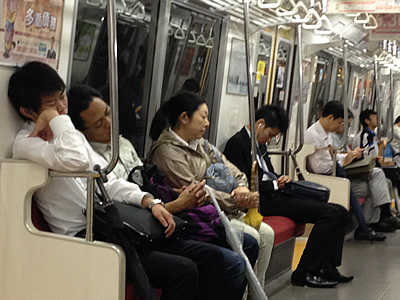
Japanese people sleep everywhere throughout the day, probably due to overwork and stress.
This lifestyle doesn’t allow much time at all for sleep, self-nurturing, exercise, or for family bonds to develop. Many times the pressure, fatigue and loneliness are so great, it leads to suicide. There is even a Japanese term that translates as “death from overwork”.
Learning from a land of contradictions
It’s all these contradictions that make Japan so interesting and mysterious. The crossing over of ancient tradition and high technology, quiet rituals and chaotic cities, primal vs. modern diet and lifestyles.
It’s really never enough to look at a list of the longest living peoples and make assumptions, as each country and culture is so complex, and true health is gained from a combination of factors which are never clear cut. However, by looking at the various cultures of the world – their traditions, daily habits and contradictions – we can begin to learn what may be best for our own health.
Do you think the Japanese diet and lifestyle are good models of health of longevity? Why?
Are the Japanese the Healthiest People in the World?

